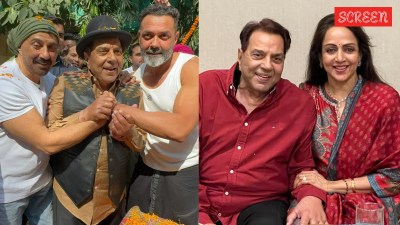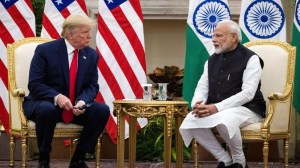The agony of Sanjay Dutt
Sanjay Dutt8217;s conviction and imprisonment have understandably caused anguish to his family members and his numerous fans.

Note: This column was first printed in Aug, 2007.
Sanjay Dutt8217;s conviction and imprisonment have understandably caused anguish to his family members and his numerous fans. But remember that Sanjay had competent legal assistance, had a fair trial, during which he was on bail for considerable time, and was acquitted of grave TADA offences. His conviction under the Arms Act was not for possessing a harmless air gun but an AK-57 rifle, a 9 mm pistol and some cartridges, which, according to Judge Kode, were capable of mass destruction although Sanjay had not used them. It is felt that the sentence of six years rigorous imprisonment is harsh when the minimum sentence prescribed is five years, and it is said the court could have directed simple imprisonment. Sanjay has the right of appeal to a higher court, where he can challenge the judgment for all its supposed legal infirmities and also apply for bail.
No doubt Sanjay must be dealt with fairly and provided with every facility to which he is entitled, like any other person. But dispensation of justice and treatment of a convict cannot depend upon the person8217;s personality or popularity. There cannot be celebrity justice delivery system. Law must be applied even-handedly. Bollywood is no exception and the sooner that is realised the better. Any preferential treatment of Sanjay would send a wrong signal and reinforce the pervasive belief that the system can be manipulated to serve the interests of the rich and powerful.
Unique strike by lawyers
Strikes by lawyers cause unnecessary hardship to the much-harassed litigants and are often directed against the wrong target. If a policeman beats up a lawyer without justification there is no earthly reason to strike against the courts instead of approaching them for strong action against the erring police personnel. Besides, these strikes tantamount to flouting the law laid down by the Supreme Court that, barring exceptional circumstances, strikes by lawyers are unlawful.
Some strikes are exceptional. On the last working day of every month, lawyers practicing in the Rajasthan High Court at Jodhpur go on strike as a protest against the setting up of a high court bench in Jaipur. This practice of strikes for over 20 years or more has now developed into a convention and in course of time may acquire the status of a tradition. Since the ethos of our country is to respect tradition, it would be sacrilegious to ban these strikes. Incidentally, the Jaipur bench of the high court has been functioning for over 30 years without any serious complaint by litigants, who after all are the consumers of justice.
Tiresome litigants in person
Litigants arguing in person in the Supreme Court is a common phenomenon. Some of them refuse to avail of legal aid and argue interminably because they get identified with their case. Judges are generally indulgent towards them, which is often abused to the discomfort of lawyers waiting for their cases to be taken up.
In Ukraine there is an interesting provision. A litigant is required to provide a letter of authority to the court for his representation and submit papers for a possible grant of legal aid. Criminal proceedings were instituted against an Ukrainian national for his involvement in smuggling, drug-trafficking and other serious offences. The accused was invited to appoint a lawyer and submit a letter of authority for his representation because, in the court8217;s view, the case was complex from a legal and factual point of view and a lawyer8217;s participation was necessary. The litigant refused to appoint a lawyer and insisted on representing himself, or alternatively, to be represented by his wife. Despite the registry of the court informing him that on his failure to appoint a lawyer his case would be struck out, the litigant insisted on his wife representing him. Thereafter, he unsuccessfully sought relief from the European Court of Human Rights at Strasbourg.
In cases where litigants unreasonably refuse legal aid and endlessly argue and waste the court8217;s time, a modified version of the Ukrainian provision is worth considering.
- 01
- 02
- 03
- 04
- 05































